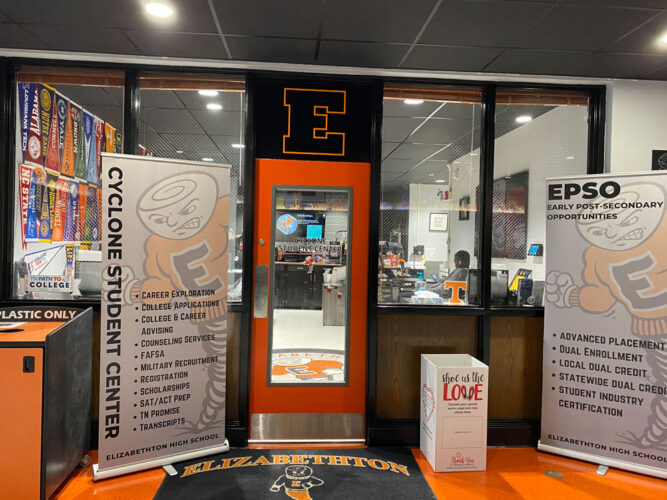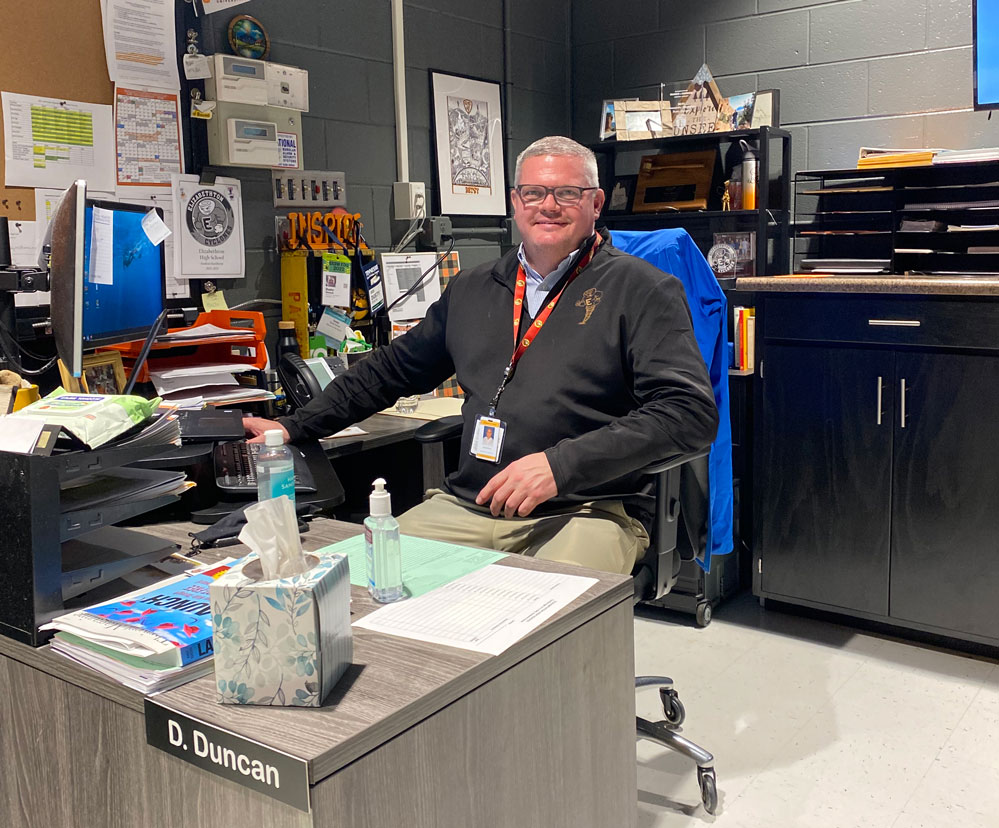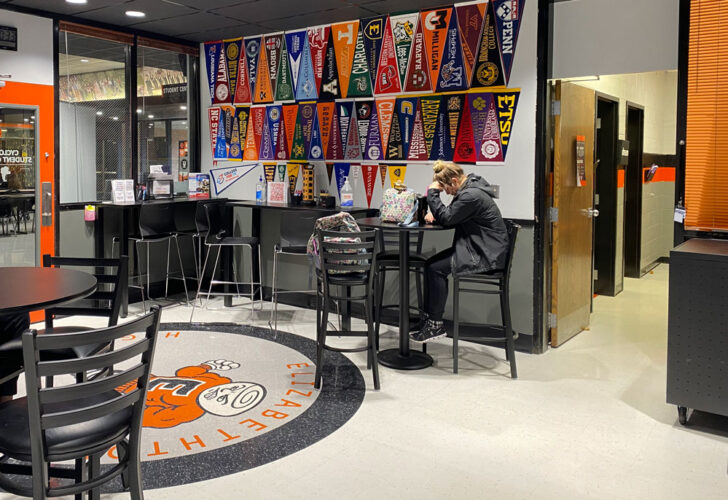How Educators Transformed Their School by Listening to Students
This story was produced by The 74, a non-profit, independent news organization focused on education in America.The main office at Elizabethton High School in rural northeast Tennessee wasn’t always a place students enjoyed visiting. As a new ninth grader in the fall of 2019, Jayci Bowers recalled an imposing room with a long desk, a secretary and fluorescent lights that reminded her of a doctor’s office. Even though the two counselors for students had their own small offices within the space, Jayci said, “it just felt really closed off to students.”Today, that front office has been completely transformed into the Cyclone Student Center, named for the school’s mascot. Its old wooden door was replaced with a glass one students can see through. Inside, they’re greeted by warm lighting, a wall covered with college pennants and Cyclone memorabilia. There are small desks and high-top tables where they can work on college applications and a zen garden for relaxation.“I feel like I’m walking into a place where I can hang out and chill,” Bowers said.The school also doubled the number of counselors in the center — at the students’ request — by adding two who focus on college and career exploration and advising.

Staff and students say these changes illustrate how listening to students can take a high school in a new, more vibrant direction. Students have been playing a bigger role at Elizabethton High School ever since its selection as an XQ Super School in 2017. They encouraged the school to add two project-based learning classes for community improvements and entrepreneurship. Elizabethton then expanded the number of classes with project-based learning, including one on teaching as a profession that was suggested by students.The high school of about 850 students is now a thriving community hub, with a student liaison to the local school board, a coffee shop designed and run by students and a community partnership advisory group that meets monthly — so local businesses and higher education institutions stay connected to students exploring their future.“Our community believes in progress,” assistant principal Sheri Nelson said. Elizabethton is a small city of about 14,000 people with just one public high school in a region that was hit hard by the opioid crisis. Nelson said people believe the students “need to bring the progress to the community. They don’t want our students to go somewhere else.”Elizabethton and its educators are using youth voice and choice to improve their high school and community at large. This is one of XQ’s research-based design principles for rethinking the high school experience. The goal is to create more meaningful, engaged learning that looks beyond the school’s walls. By listening to students, Elizabethton’s educators learned they also wanted something else: connections with trusting, caring adults.
For fresh ideas on bringing more student voice to your school, sign up for The XQ Xtra — a newsletter for educators that comes out twice a month. Sign up here.
Why Students Wanted More Counselors
Since becoming an XQ partner, Elizabethton High School has solicited feedback from students on a regular basis in different settings. Bowers recalled joining one of two groups that toured another XQ school, Crosstown High School in Memphis in early 2020. The difference was striking. “It was a lot of inviting spaces, lots of windows and natural lighting,” she said. The Memphis school is inside a renovated, multi-use development. By contrast, Elizabethton High School is a squat, brick 1970s building with no windows.Bowers and her classmates asked for a more open, cheerful space like what they saw at Crosstown. Around that same time, Nelson was reviewing annual social-emotional surveys.“Students did not know their counselor,” she said. “I mean, obviously, when you have a 430-to-1 ratio, how can they know and serve those students effectively?”That ratio was close to the national average, even though the American School Counselor Association recommends 250-to-1. It points to studies showing students with more access to college counselors and lower student-to-counselor ratios are more likely to graduate and less likely to have behavioral problems. But too many schools can’t afford to hire enough counselors.

Only 21.5% of Elizabethton’s adults have a bachelor’s degree, according to the U.S. Census. The high school had already created a course to help seniors prepare for college. But some students needed additional support and guidance, said Dusty Duncan, one of the school’s two college and career advisors. He previously worked in the admissions office at East Tennessee State University.“In the upper East Tennessee area as a whole, generational poverty is a prevalent issue that affects so many students and families,” he explained, adding that the high school’s staff are committed to ensuring all students, regardless of background, get the resources they need to succeed.
Giving Students More Options
Elizabethton’s college and career advisors work with students across all grade levels, but the emphasis is on helping juniors and seniors prepare for life after high school. In September, about 150 students — mostly seniors — attended a college fair in the local area. Group visits were then scheduled to all different types of colleges, universities and technical schools.Throughout the fall and winter, seniors get regular updates about scholarship opportunities and are notified about special weeks when state school applications are free. The Cyclone Student Center sends out a monthly newsletter to families and coordinates daily in-school visits from college, military and career professionals.Gracie Fields, a senior who plans to study Fishery and Wildlife Science, found the scholarship newsletter useful.“There are a couple that I’ve actually gotten that have been extremely helpful that I wouldn’t have known about if they hadn’t made those announcements,” she said, adding that she won a full ride to attend her first choice school, Tennessee Tech University. She said she and her older brother are the first members of their family to go to college.

As the school’s student liaison, Fields also encourages her peers to visit the student center, where counselors help them fill out college and financial aid applications. Bowers said she applied to more schools than planned after learning about scholarships.“Families are so busy right now, that the need for dedicated professionals during the school day is more important than ever,” said Judy Fletcher, another of the college and career advisors.Even if they have their eyes set on four-year colleges, most Elizabethton students also apply to two-year colleges because the state’s Tennessee Promise allows them to attend tuition-free. A survey by XQ found more than 80% of Elizabethton’s 2022 graduates planned to enroll in college (there’s no state data yet on how many actually did); and 56 percent of those who said they were going to two-year colleges also planned to transfer to four-year schools.Among Elizabethton’s graduating seniors in 2022, more than half already earned dual enrollment credits at local colleges and universities. Dual enrollment programs have expanded in Tennessee with state funding and Elizabethton now partners with six local post-secondary institutions, including East Tennessee State University.By actively including all students in post-high school planning, Elizabethton offers a more holistic definition of school success, said XQ Head of Schools Mary Ryerse.“As a country, we have a shallow definition of a ‘successful high school’ based on Advanced Placement enrollment or graduation rates,” she explained. “But we don’t look often enough at whether schools are helping students advance their concrete post-secondary plans by taking dual enrollment courses, applying for scholarships and seeking additional sources of financial aid.”Elizabethton’s counselors also encourage students to pursue industry training. Last year, 12% of its graduates got into the Tennessee College of Applied Technology, an increase from five percent in 2018. Nelson said that’s a plus because some of those students might not otherwise have had a post-graduation plan. Duncan, who also serves as the school’s community partnership director and coordinates various outreach events, said local businesses like a tool company and the chamber of commerce are stepping up to offer more workplace learning.Deirdra Hawkes, director of programs and advocacy for the American School Counselor Association, said it’s important for high schools to recognize that college and career support is a specialized part of counseling.“It’s easy to go into a classroom and deliver classroom instruction on college planning,” she explained. “It’s another thing to follow up with individual students to find out what they need individual help with and support.” And high schoolers need help exploring their options long before their senior year.It’s too soon to say what impact Elizabethton High School’s new student center is making on college-going, especially at a time when fewer students are opting for college. But in 2022, Elizabethton High School’s leaders said 94% of its 185 seniors filled out applications with the state’s Tennessee Promise program. And 89% filled out their FAFSA forms. The school’s 93% on-time graduation rate for 2022 exceeded the state’s and even rose despite the pandemic.Staff and students say they can tell more teens are using the student center to talk about their future. Sam Bowers, a senior (no relation to Jayci), said Duncan spent “days at a time” helping him complete the University of Tennessee application and others. Now, he’s bringing fellow students into the center as a student ambassador — a gig that used to mean showing ninth graders around the building and its “Culture Wall” with Elizabethton’s history and values. But Bowers now takes new students into the Cyclone Student Center, so they won’t think it’s only for juniors and seniors preparing for college. He wants them to see that a counselor isn’t “some scary adult that sits behind closed doors and doesn’t interact.”Nelson said listening to students is key to improving a school and its greater community. She hopes Elizabethton High School can keep its two college and career advisors after their funding runs out this year because getting a college degree helps students “take care of their own” — their families and their city.“No longer do we look at school as ending at the 12th grade,” Nelson said. “We think that we have to look at our students’ success beyond high school.”


